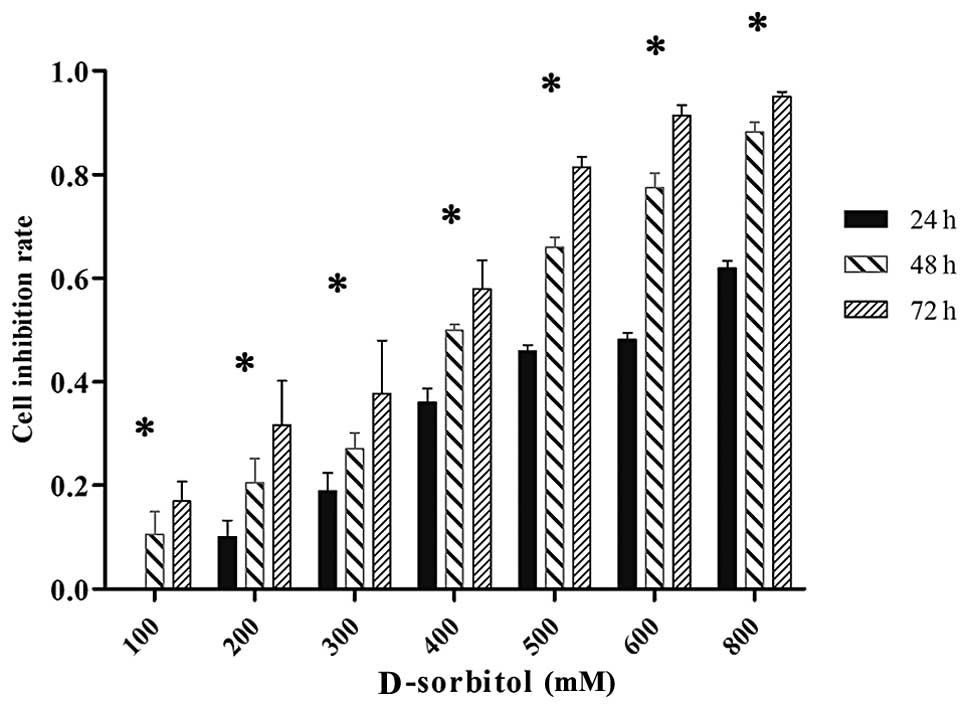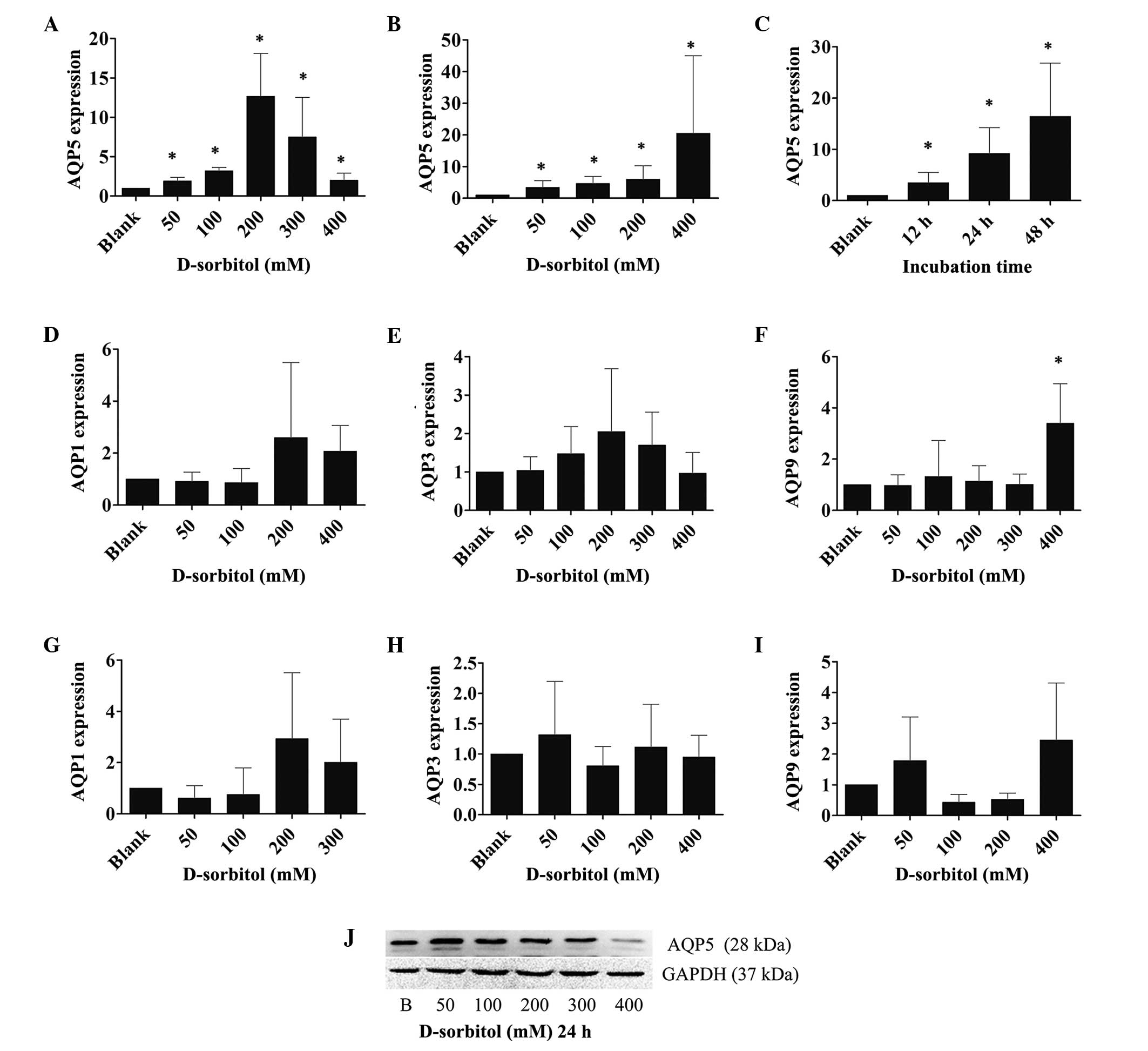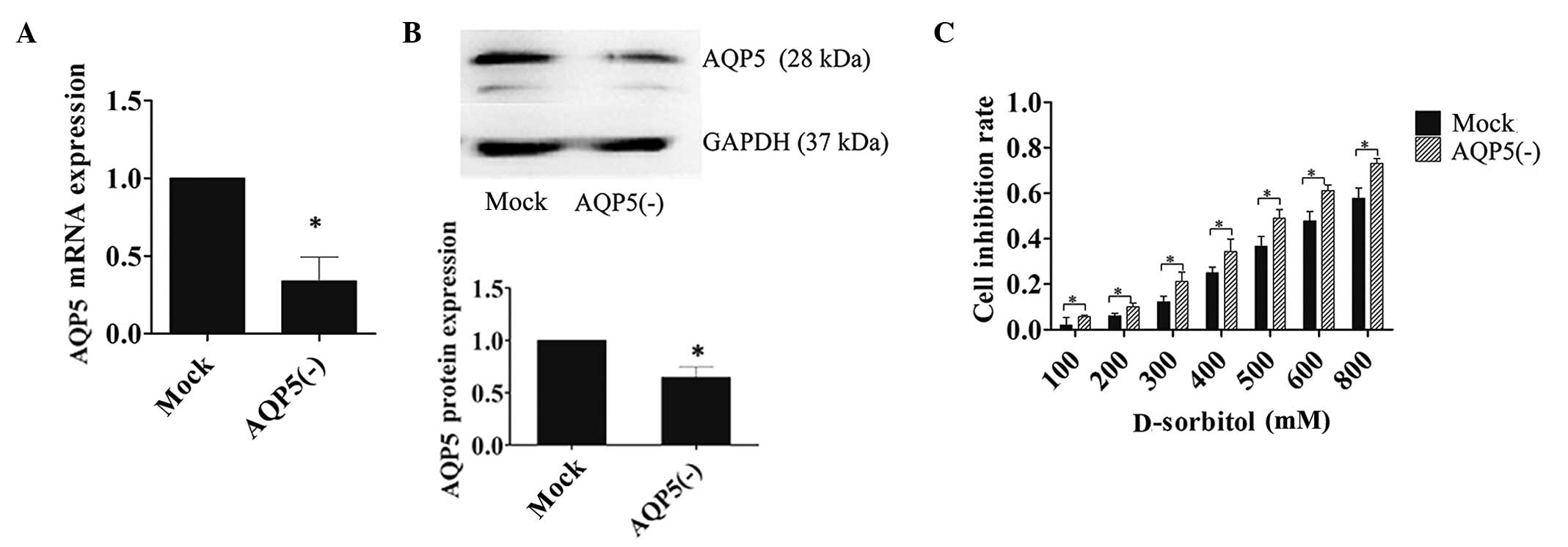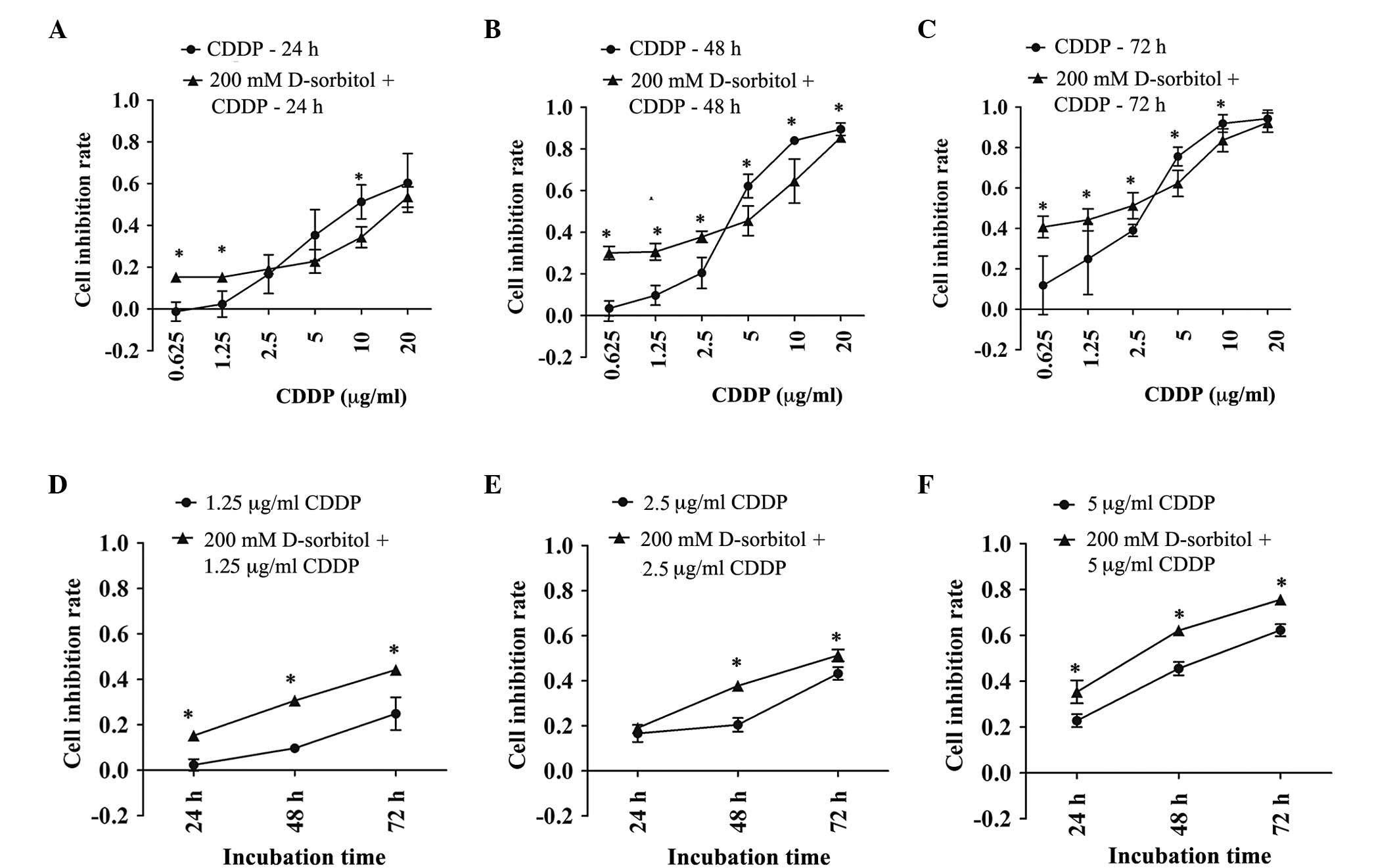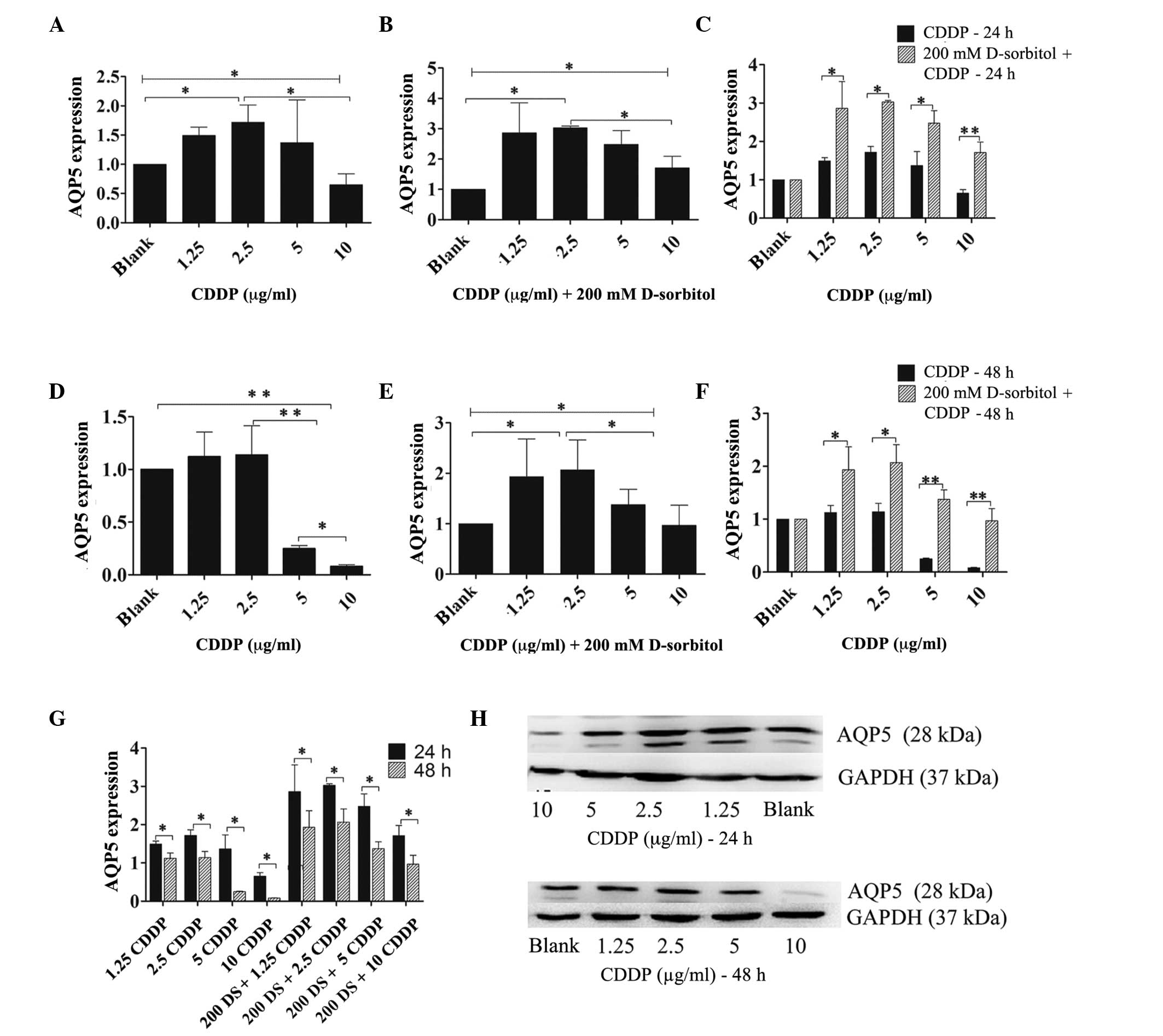|
1
|
Wiedemeyer WR, Beach JA and Karlan BY:
Reversing platinum resistance in high-grade serous ovarian
carcinoma: Targeting BRCA and the homologous recombination system.
Front Oncol. 4(34)2014.PubMed/NCBI
|
|
2
|
Bogliolo S, Cassani C, Gardella B,
Musacchi V, Babilonti L, Venturini PL, et al: Oxaliplatin for the
treatment of ovarian cancer. Expert opinion on investigational
drugs. 2015.24(9): 1275–86. PubMed/NCBI
|
|
3
|
Benga G: Water channel proteins (later
called aquaporins) and relatives: Past, present and future. IUBMB
Life. 61:112–133. 2009. View
Article : Google Scholar : PubMed/NCBI
|
|
4
|
Gomes D, Agasse A, Thiébaud P, Delrot S,
Gerós H and Chaumont F: Aquaporins are multifunctional water and
solute transporters highly divergent in living organisms. Biochim
Biophys Acta. 1788:1213–1228. 2009. View Article : Google Scholar : PubMed/NCBI
|
|
5
|
Agre P and Kozono D: Aquaporin water
channels: Molecular mechanisms for human diseases. FEBS Lett.
555:72–78. 2003. View Article : Google Scholar : PubMed/NCBI
|
|
6
|
Nozaki K, Ishii D and Ishibashi K:
Intracellular aquaporins: Clues for intracellular water transport?
Pflugers Arch. 456:701–707. 2008. View Article : Google Scholar : PubMed/NCBI
|
|
7
|
Zardoya R: Phylogeny and evolution of the
major intrinsic protein family. Biol Cell. 97:397–414. 2005.
View Article : Google Scholar : PubMed/NCBI
|
|
8
|
Zhang D, Tan YJ, Qu F, Sheng JZ and Huang
HF: Functions of water channels in male and female reproductive
systems. Mol Aspects Med. 33:676–690. 2012. View Article : Google Scholar : PubMed/NCBI
|
|
9
|
Ribatti D, Ranieri G, Annese T and Nico B:
Aquaporins in cancer. Biochim Biophys Acta. 1840:1550–1553. 2014.
View Article : Google Scholar : PubMed/NCBI
|
|
10
|
Yang JH, Yu YQ and Yan CX: Localisation
and expression of aquaporin subtypes in epithelial ovarian tumours.
Histol Histopathol. 26:1197–1205. 2011.PubMed/NCBI
|
|
11
|
Takal MK, Baykal C, Başer E, Kaya MD,
Dursun P, Ozen O, Haberal AN and Ayhan A: Does Aquaporin-1
expression have clinical significance in serous epithelial ovarian
cancer? J Turk Ger Gynecol Assoc. 14:130–135. 2013. View Article : Google Scholar : PubMed/NCBI
|
|
12
|
Yang JH, Shi YF, Cheng Q and Deng L:
Expression and localization of aquaporin-5 in the epithelial
ovarian tumors. Gynecol Oncol. 100:294–299. 2006. View Article : Google Scholar : PubMed/NCBI
|
|
13
|
Yang JH, Shi YF, Chen XD and Qi WJ: The
influence of aquaporin-1 and microvessel density on ovarian
carcinogenesis and ascites formation. Int J Gynecol Cancer.
16(Suppl 1): 400–405. 2006. View Article : Google Scholar : PubMed/NCBI
|
|
14
|
Ji C, Cao C, Lu S, Kivlin R, Amaral A,
Kouttab N, Yang H, Chu W, Bi Z, Di W and Wan Y: Curcumin attenuates
EGF-induced AQP3 up-regulation and cell migration in human ovarian
cancer cells. Cancer Chemother Pharmacol. 62:857–865. 2008.
View Article : Google Scholar : PubMed/NCBI
|
|
15
|
Yang J, Yan C, Zheng W and Chen X:
Proliferation inhibition of cisplatin and aquaporin 5 expression in
human ovarian cancer cell CAOV3. Arch Gynecol Obstet. 285:239–245.
2012. View Article : Google Scholar : PubMed/NCBI
|
|
16
|
Yan C, Yang J, Shen L and Chen X:
Inhibitory effect of Epigallocatechin gallate on ovarian cancer
cell proliferation associated with aquaporin 5 expression. Arch
Gynecol Obstet. 285:459–467. 2012. View Article : Google Scholar : PubMed/NCBI
|
|
17
|
Day RE, Kitchen P, Owen DS, Bland C,
Marshall L, Conner AC, Bill RM and Conner MT: Human aquaporins:
Regulators of transcellular water flow. Biochim Biophys Acta.
1492–1506. 1840:2014. View Article : Google Scholar : PubMed/NCBI
|
|
18
|
Gao L, Gao Y, Li X, Howell P, Kumar R, Su
X, Vlassov AV, Piazza GA, Riker AI, Sun D and Xi Y: Aquaporins
mediate the chemoresistance of human melanoma cells to arsenite.
Mol Oncol. 6:81–87. 2012. View Article : Google Scholar : PubMed/NCBI
|
|
19
|
Miao ZF, Chang EE, Tsai FY, Yeh SC, Wu CF,
Wu KY, Wang CJ and Tsou TC: Increased aquaglyceroporin 9 expression
disrupts arsenic resistance in human lung cancer cells. Toxicol In
Vitro. 23:209–216. 2009. View Article : Google Scholar : PubMed/NCBI
|
|
20
|
Yoshino Y, Yuan B, Kaise T, Takeichi M,
Tanaka S, Hirano T, Kroetz DL and Toyoda H: Contribution of
aquaporin 9 and multidrug resistance-associated protein 2 to
differential sensitivity to arsenite between primary cultured
chorion and amnion cells prepared from human fetal membranes.
Toxicol Appl Pharmacol. 257:198–208. 2011. View Article : Google Scholar : PubMed/NCBI
|
|
21
|
Chen XJ, Chen WM, Ding XY, Zheng W, Zhang
Q and Yang JH: Effects of aquaporins on chemosensitivity to
cisplatin in ovarian cancer cells. Arch Gynecol Obstet.
290:525–532. 2014. View Article : Google Scholar : PubMed/NCBI
|
|
22
|
Hoffert JD: Hypertonic induction of
aquaporin-5 expression through an ERK-dependent pathway. J Biol
Chem. 275:9070–9077. 2000. View Article : Google Scholar : PubMed/NCBI
|
|
23
|
Zhou B, Ann DK, Li X, Kim KJ, Lin H, Minoo
P, Crandall ED and Borok Z: Hypertonic induction of aquaporin-5:
Novel role of hypoxia-inducible factor-1alpha. Am J Physiol Cell
Physiol. 292:C1280–C1290. 2007. View Article : Google Scholar : PubMed/NCBI
|
|
24
|
Pedersen PS, Braunstein TH, Jørgensen A,
Larsen PL, Holstein-Rathlou NH and Frederiksen O: Stimulation of
aquaporin-5 and transepithelial water permeability in human airway
epithelium by hyperosmotic stress. Pflugers Arch. 453:777–785.
2007. View Article : Google Scholar : PubMed/NCBI
|
|
25
|
Sidhaye VK, Güler AD, Schweitzer KS,
D'Alessio F, Caterina MJ and King LS: Transient receptor potential
vanilloid 4 regulates aquaporin-5 abundance under hypotonic
conditions. Proc Natl Acad Sci USA. 103:4747–4752. 2006. View Article : Google Scholar : PubMed/NCBI
|
|
26
|
Sugiyama Y, Ota Y, Hara M and Inoue S:
Osmotic stress up-regulates aquaporin-3 gene expression in cultured
human keratinocytes. Biochim Biophys Acta. 1522:82–88. 2001.
View Article : Google Scholar : PubMed/NCBI
|
|
27
|
Li SZ, McDill BW, Kovach PA, Ding L, Go
WY, Ho SN and Chen F: Calcineurin-NFATc signaling pathway regulates
AQP2 expression in response to calcium signals and osmotic stress.
Am J Physiol Cell Physiol. 292:C1606–C1616. 2006. View Article : Google Scholar : PubMed/NCBI
|
|
28
|
Saito T, Saito T, Kasono K, Tamemoto H,
Kawakami M, Sasaki S and Ishikawa SE: Hypotonicity reduces the
activity of murine aquaporin-2 promoter induced by dibutyryl cAMP.
Exp Physiol. 93:1147–1156. 2008. View Article : Google Scholar : PubMed/NCBI
|
|
29
|
Cao C, Yu X, Liao Z, Zhu N, Huo H, Wang M,
Ji G, She H, Luo Z and Yue S: Hypertonic saline reduces
lipopolysaccharide-induced mouse brain edema through inhibiting
aquaporin 4 expression. Crit Care. 16:R1862012. View Article : Google Scholar : PubMed/NCBI
|
|
30
|
Chen Z, Zhang Z, Gu Y and Bai C: Impaired
migration and cell volume regulation in aquaporin 5-deficient
SPC-A1 cells. Respir Physiol Neurobiol. 176:110–117. 2011.
View Article : Google Scholar : PubMed/NCBI
|
|
31
|
Solenov E, Watanabe H, Manley GT and
Verkman AS: Sevenfold-reduced osmotic water permeability in primary
astrocyte cultures from AQP-4-deficient mice, measured by a
fluorescence quenching method. Am J Physiol Cell Physiol.
286:C426–C432. 2004. View Article : Google Scholar : PubMed/NCBI
|
|
32
|
Thiagarajah JR and Verkman AS: Aquaporin
deletion in mice reduces corneal water permeability and delays
restoration of transparency after swelling. J Biol Chem.
277:19139–19144. 2002. View Article : Google Scholar : PubMed/NCBI
|















